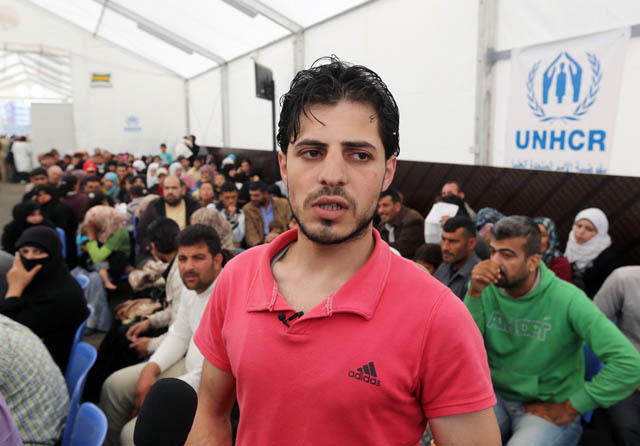TRIPOLI, Lebanon — More than a million people fleeing Syria's war have registered as refugees in Lebanon, the UN said Thursday, with many living in misery in a tiny country overstretched by the crisis.
And the number is swelling by the day, with the UN refugee agency (UNHCR) saying it registers 2,500 new refugees in Lebanon every day — more than one a minute.
At a crowded centre in Tripoli, Lebanon's second city, hundreds of refugees were seen on Thursday queueing to register.
Yehia, an 18-year-old from Homs, was identified by as the millionth refugee to be registered.
He told AFP he lives in a garage in Dinniyeh, near Tripoli, with his mother and two sisters.
His father, a carpenter, was killed by a sniper in 2011, six months after the revolt against President Bashar Assad broke out.
"It is a disaster," said Yehia. "My mother sold all her gold so we could pay the $250 (191 euros) monthly rent. We don't know what will happen to us in the future."
His main wish is to go back to school to finish his studies, which were interrupted by the war.
"The fact that there were one million Syrians before me who are going hungry, even dying here is very painful," Yehia said sorrowfully.
The UNHCR says that Syrian refugees, half of them children, now equal a quarter of Lebanon's resident population, warning that most of them live in poverty and depend on aid for survival.
UNHCR representative Ninette Kelly branded the one million figure as "a devastating marker".
"Each one of these numbers represents a human life who, like us, have lives of their own, but who've lost their homes, they've lost their family members, have lost their future," she told reporters.
Kelly said Lebanon has become the country with the highest per capita concentration of refugees in the world.
Lebanon "is literally staggering under the weight of this problem. Its social services are stressed, health, education, its very fragile infrastructure is also buckling under the pressure."
The massive crisis is compounded by a spillover of the violence that has ravaged Syria for the past three years, with Lebanon experiencing frequent bombings and clashes even as it grapples with political deadlock and an economic downturn.
In a statement, UNHCR chief Antonio Guterres urged increased international action to help Lebanon deal with this "immense" and "staggering" crisis.
Social Affairs Minister Rachid Derbas also appealed for support, saying Lebanon "cannot carry this burden alone."
The strain has been particularly felt in the public sector, with health and education services, as well as electricity, water and sanitation affected.
The humanitarian appeal for Lebanon "is only 14 per cent funded," even as the needs of a rapidly growing refugee population become ever more pressing, Kelly said.
Girls married young
The vast majority of refugee children are not attending school.
"The number of school-aged children is now over 400,000, eclipsing the number of Lebanese children in public schools. These schools have opened their doors to over 100,000 refugees, yet the ability to accept more is severely limited," the UNHCR said.
Because of the dire economic situation their families endure, many children are now working, "girls can be married young and the prospect of a better future recedes the longer they remain out of school," it added.
Walid, a 22-year-old who shines shoes to scrape out a living in Tripoli, said: "Our situation is very sad, and we refugees really live from hand to mouth."
Unlike Turkey and Jordan, which are also hosting hundreds of thousands of Syrians, Lebanon has not set up official camps.
Alaa Ajam, owner of a foreign exchange shop in Tripoli, said "of course (the refugee crisis) is a burden... We are in solidarity with the Syrians, but like other countries we should have camps."
Tens of thousands of families live in insalubrious informal settlements dotted around the country, many of them near the restive border with Syria.
The conflict has killed more than 150,000 people, according to the Syrian Observatory for Human Rights, with half of the population estimated to have fled their homes.
